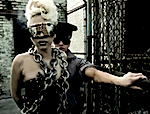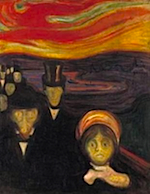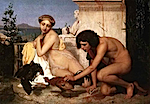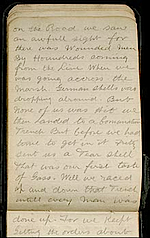By JONATHAN P. BOWEN [The Rutherford Journal] – Among the pages that I installed on the OUVL web server was a page with a list of links to museum-related websites that I discovered as I traversed the web, essentially created as a personal bookmarking resource, but also available to anyone else surfing the web. This was part of an ‘archive service’ that I created at OUCL for computing-related resources. Files such as documents had previously been available via FTP and an email service that automatically responded to requests sent as commands by electronic mail, thus allowing those with email-only contact on the Internet to access resources. Continue reading “Noted: Curating everything.” »

Gaga, looking at butts.
By NANCY BAUER [The New York Times] – Gaga wants us to understand her self-presentation as a kind of deconstruction of femininity, not to mention celebrity. As she told Ann Powers, “Me embodying the position that I’m analyzing is the very thing that makes it so powerful.” Of course, the more successful the embodiment, the less obvious the analytic part is. And since Gaga herself literally embodies the norms that she claims to be putting pressure on (she’s pretty, she’s thin, she’s well-proportioned), the message, even when it comes through, is not exactly stable. It’s easy to construe Gaga as suggesting that frank self-objectification is a form of real power.
Continue reading “Noted: Women go Gaga over feminism.” »
By BEN HUH [Paid Content] – For all our lives, one device has dominated and shaped our cultural understanding of the world. The television has consumed years of our lives and has been our window to the outside world. In fact, going all the way back to the 1930s, the television has physically occupied a central place in our family lives. It wasn’t until the popularization of internet that the cultural hegemony of television has come into question. But boy, are we questioning it now.
With its ability to remix content, satire and criticism, Internet Culture is slowly chipping away at the cultural fortress built by television, radio and other forms of mass media—commonly referred to as Popular Culture. Continue reading “Noted: How the 'net is making popular culture unpopular.” »
By STEPHANIE MENCIMER [Mother Jones] – Judge Tauro’s ruling also creates some interesting political dynamics for a group that isn’t a party to the lawsuit: the tea party movement. Tauro based part of his decision on the tea partiers’ favorite constitutional amendment: the 10th, which enshrines states’ rights into the founding document. Tea Partiers and other die-hard “conservative constitutionalists” frequently insist that the 10th Amendment should be applied rigorously.
Continue reading “Noted: The art of the judicial petard-hoist.” »
By EMILY COLETTE WILKINSON [In Character] – Between the hyper-intellectual abstractions of university philosophers and the calculating, materialistic schemes of self-help gurus, lies another philosophy. This is the philosophy of the ancients, of Marcus Aurelius. It is a practice that intends to help individuals answer life’s great metaphysical questions in both material and spiritual terms: What is my place is the world, the cosmos? What is the purpose of existence? How do I live a good life? What is happiness and how do I achieve it?
Continue reading “Noted: The matters Marcus Aurelius addressed to Marcus Aurelius.” »
By ELISA TAMARKIN [Common-place] – Judith Halberstam worries, in a story on “The Death of English” for Inside Higher Ed, that the New York Times has stopped dispatching a reporter to the annual meeting of the Modern Language Association to write up its yearly mockery of the conference (with its “wacky” paper titles) and to savage the “sad efforts of earnest English profs to look hip, cool and vaguely relevant.” For Halberstam, we need to “update our field” or it won’t even be worth insulting, and she argues that literary scholars in particular have not “kept up” with emerging areas of focus (on empire, for example, or popular culture) that could replace traditional fields as they become “irrelevant as areas of study.” She wants her arguments to provoke and scandalize, not just to make English a vital discipline in a “rapidly changing world,” but to make sure that it stays newsworthy too: “Let’s hope that in another decade The New York Times … is forced to spend the entire year reporting in meaningful ways on the reinvigoration of the humanities.”
Continue reading “Noted: Even if it's news, is it important?” »

You are here.
By CHRISTIAN WIMAN [The American Scholar] – There is a distinction to be made between the anxiety of daily existence, which we talk about endlessly, and the anxiety of existence, which we rarely mention at all. The former fritters us into dithering, distracted creatures. The latter attests to—and, if attended to, discloses—our souls. And yet it is a distinction without a difference, perhaps, and as crucial to eventually overcome as it is to initially understand, for to be truly alive means to feel one’s ultimate existence within one’s daily existence, to feel one’s trivial, frittering anxieties acquiring a lightness, a rightness, a meaning. So long as anxiety is merely something to be alleviated, it is not life, or we are not alive enough to experience it as such.
I don’t mean to be describing an intellectual transformation, or a transformation that is available only to “intellectuals.” I suppose that for many people—people inclined to read essays like this one, for instance—the transformation might seem to begin with a mental decision and a definite application of the will. In fact, I think taking such a step indicates that some rift of meaning and feeling has already opened inside of us, and we are clutching, consciously or unconsciously, at the rock face and rubble above this sudden abyss. Continue reading “Noted: This is why you are your anxieties.” »
By IBN WARRAQ [New English Review] – Soon after 11 September, 2001, the left-wing British weekly journal The New Statesman published an article provocatively entitled “The Great Koran Con Trick” by Martin Bright. The article was essentially a more crude and self-consciously sensationalist version of an article written by Toby Lester, a couple of years earlier, entitled ‘What is the Koran?” [1999]. Bright rehearsed the familiar theories of the revisionists, centered on the work of John Wansbrough of the School of African and Oriental Studies [SOAS], and those influenced by him, scholars such as Patricia Crone, Michael Cook, Andrew Rippin, and Gerald Hawting. The article resulted in many letters to the Editor, and six of them were published the following week [17 December, 2001]. The longest was from Patricia Crone, writing from the Institute for Advanced Study at Princeton. In her letter, Crone wrote, “modern historians are not interested in the truth and falsehood of the religion they study at all. Continue reading “Noted: History is not faith.” »
By MICHAEL SIMS [The Chronicle of Higher Education] – Reading about these fictional bodies—bodies of victims and of monsters—reminded me of bodies I had known. I remembered my own encounters with death, from riding in a hearse with a corpse strapped to a gurney behind us to sitting beside a friend’s father in the hospital as he sighed his last breath. I remembered my momentary horror and panic when I fell into the grave. It wasn’t like falling off a ladder. This was a grave.
As I worked on the introduction to the anthology, I merged the two main topics I write about: natural history and Victorian literature. I tried to look at vampires from a scientific point of view. Continue reading “Noted: Vampires we have known, scientifically speaking.” »
 By TOM L. FREUDENHEIM [The Wall Street Journal] – Some of the works are so familiar we may have forgotten who painted them; others are the ones we instinctively pass over in the inevitable visual triage that accompanies our attempts to see everything in a museum. The Getty’s exhibition is all the more remarkable when we consider that here’s an artist who was working at the same time as Ingres, Delacroix, Corot, Renoir and Cézanne—to name just a few of his famous fellow countrymen—yet was creating an oeuvre that appears to be less about painting and more about storytelling and illustration. But the exhibition’s 99 works provide us with a much more nuanced understanding of Gérôme in his varying roles as classicist, historian, ethnographer and even proto-cineaste. We have long understood, and perhaps dismissed, the artist’s taste for the exotic, but it’s also clear from the broad sweep of the show that there’s a consistent undercurrent of eros, irony and humor, suggesting that perhaps Gérôme had an inkling about how later generations might view his work.
By TOM L. FREUDENHEIM [The Wall Street Journal] – Some of the works are so familiar we may have forgotten who painted them; others are the ones we instinctively pass over in the inevitable visual triage that accompanies our attempts to see everything in a museum. The Getty’s exhibition is all the more remarkable when we consider that here’s an artist who was working at the same time as Ingres, Delacroix, Corot, Renoir and Cézanne—to name just a few of his famous fellow countrymen—yet was creating an oeuvre that appears to be less about painting and more about storytelling and illustration. But the exhibition’s 99 works provide us with a much more nuanced understanding of Gérôme in his varying roles as classicist, historian, ethnographer and even proto-cineaste. We have long understood, and perhaps dismissed, the artist’s taste for the exotic, but it’s also clear from the broad sweep of the show that there’s a consistent undercurrent of eros, irony and humor, suggesting that perhaps Gérôme had an inkling about how later generations might view his work.
Continue reading “Noted: Gérôme emerges from his well – and goes Hollywood.” »
From an interview with JAMES POULOS [The University Bookman] – No conversation would be complete without reference to Philip Rieff, the great sociologist whose The Triumph of the Therapeutic was released in a fortieth-anniversary edition by ISI Books. Not only is Rieff one of our best guides to what kind of individual we have on our hands today and why, he’s also a bracing antidote to nostalgic thinking about recovering a happy past. He’s also a Jewish thinker, and the influence of Hebraic thought on postmodern conservatism, at least as I see it, is significant enough to mention here.
was released in a fortieth-anniversary edition by ISI Books. Not only is Rieff one of our best guides to what kind of individual we have on our hands today and why, he’s also a bracing antidote to nostalgic thinking about recovering a happy past. He’s also a Jewish thinker, and the influence of Hebraic thought on postmodern conservatism, at least as I see it, is significant enough to mention here.
Continue reading “Noted: Remember, nostalgia always disappoints.” »
 By HERVÉ BERTHO – [France-Ouest] – La fête de l’Indépendance, la fête nationale américaine est célébrée un peu partout dans le monde en ce 4 juillet. L’Amérique nous fait moins rêver mais elle fascine encore car ses principes sont ceux de la fraternité universelle et de la liberté.
By HERVÉ BERTHO – [France-Ouest] – La fête de l’Indépendance, la fête nationale américaine est célébrée un peu partout dans le monde en ce 4 juillet. L’Amérique nous fait moins rêver mais elle fascine encore car ses principes sont ceux de la fraternité universelle et de la liberté.
Certes, chacun peut y porter une arme et cela fait peur quand nous comptons les morts absurdes. Certes, chacun peut y connaître la fortune mais aussi la ruine quand la liberté d’entreprendre se paye au prix de la misère et de l’abandon….
Continue reading “Noted: Independance day pour tous.” »
By CHARLES KESSLER [Imprimus] – In its own time, the New Deal was extremely popular. Among its novel elements was a new kind of economic rights. The Progressives at the turn of the century had grown nervous over the closing of the American frontier and the rise of large corporations—developments they thought threatened the common man’s equality of opportunity. Aside from anti-trust efforts and war-time taxation, however, the Progressives did not get very far toward a redistributive agenda, and were actually wary of proclaiming new-fangled rights. Continue reading “Noted: FDR's 'new constitutional order'.” »
By Michaela Schiessl [Der Spiegel] – Wilhelm Hankel is sitting on the stage at a meeting of the Kiel Institute for the World Economy. He is beaming with joy. The 81-year-old professor has just explained why the euro has always been a monstrosity, and why it will and must fail. Although the current plans to “get a living corpse to walk” are touching, he scoffed, one thing is already clear: The euro bailout package will only save the banks.
Surprisingly enough, his presentation was met with long and enthusiastic applause from his audience of economists. Continue reading “Noted: Germany's marks men get their revenge.” »

The diary. Click to enlarge.
By WALTER HUTCHINSON [From his diary, reported in The Daily Telegraph] – On Saturday July 1st we set off for the trenches about 10 o’clock. As soon as we got on the road we saw an awful sight for there was wounded men by hundreds coming from the line. When we was going across the marsh, German shells was dropping all round but none of us was hit. We then landed to a communication trench. But before we had time to get in it Fritz sent us a tear shell. That was our first taste of gas.
Well we raced up and down that trench until every man was done up for we kept getting the orders about turn, double out, and then advance. We hadn’t gone far up the trench before we came across three of our own lads lying dead. Their heads been badly damaged by a shell. Their names were Voice and Webster Brothers.
We had to go scrambling over the poor fellows – in and out, in and out. Continue reading “Excerpt: How Voice died on the Somme.” »

























